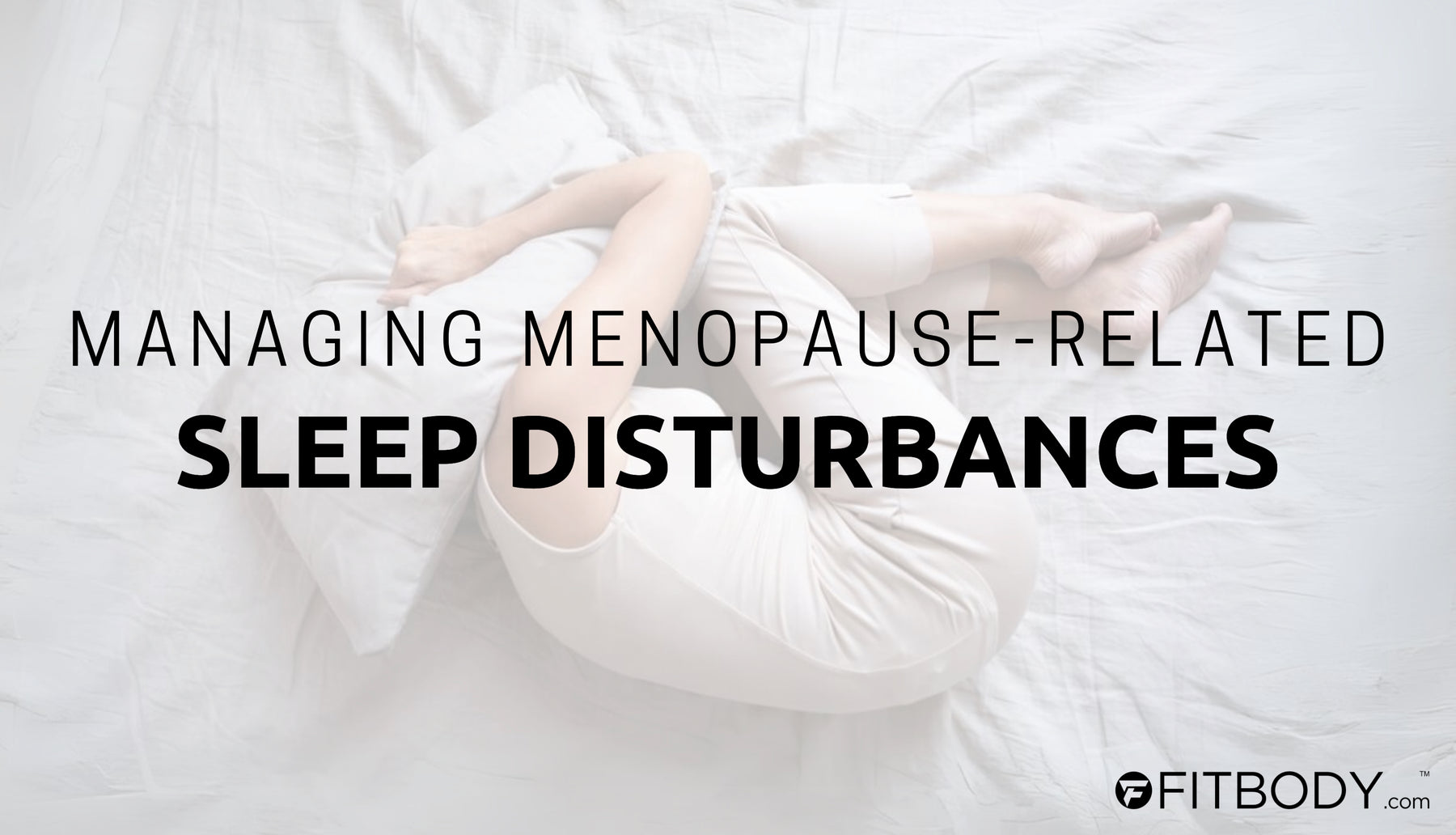
Sleepless Through the Change: Understanding and Managing Menopause-Related Sleep Disturbances
The impact of the menopausal transition on sleep is well-documented, with the National Sleep Foundation reporting that sleep disorders affect 39% to 47% of women in perimenopause and 35% to 60% of women in postmenopause. What is not as widely recognized, however, is the way in which sleep disturbances during menopause can intensify other symptoms of menopause.
Symptoms such as brain fog, anxiety, mood fluctuations, reduced sexual desire, and headaches, commonly experienced during menopause, can be aggravated by poor sleep quality. Gaining an understanding of how inadequate sleep affects these menopause symptoms, as well as learning strategies for improving sleep, could not only help in achieving a more restful night but also in reducing the intensity of other menopausal challenges.
What Causes Menopause Sleep Problems?
Menopause sleep problems arise from a complex interplay of hormonal, physical, and psychological factors. Understanding these causes can help in addressing the sleep disturbances many women experience during this transition. Here are the primary factors causing sleep problems during menopause:
-
Hormonal Changes: The most significant cause of sleep disturbances during menopause is the fluctuation in hormones, particularly estrogen and progesterone. Estrogen helps to regulate the sleep cycle and maintain body temperature, while progesterone has a calming effect and can promote sleep. As levels of these hormones decline during menopause, women may find it harder to fall asleep or stay asleep.
-
Hot Flashes and Night Sweats: These are among the most common symptoms of menopause, affecting a significant number of women. Hot flashes can cause sudden, intense heat, sweating, and discomfort, making it difficult to maintain sleep through the night. Night sweats specifically refer to excessive sweating that occurs at night, which can disrupt sleep significantly.
-
Mood Disorders: The hormonal changes during menopause can also lead to mood swings, anxiety, and depression, all of which can interfere with normal sleep patterns. Anxiety and depression are known to disrupt sleep quality, making it difficult to fall asleep or causing early morning awakenings.
-
Sleep Disorders: The risk of developing sleep disorders, such as sleep apnea and restless leg syndrome, increases during menopause. Sleep apnea is characterized by pauses in breathing during sleep and can lead to fragmented, unrefreshing sleep. Restless leg syndrome causes uncomfortable sensations in the legs along with an irresistible urge to move them, which can make it hard to fall asleep or stay asleep.
-
Other Physical Changes: Menopause can bring about other physical changes and symptoms that can interfere with sleep, such as joint pain, muscle aches, and urinary frequency. These symptoms can cause discomfort or the need to use the bathroom during the night, disrupting sleep.
-
Lifestyle and Environmental Factors: Factors such as stress, diet, lack of exercise, and poor sleep environment (e.g., a room that's too hot or too noisy) can exacerbate sleep problems during menopause. These factors, while not exclusive to menopause, can interact with menopausal symptoms to further impair sleep quality.
Addressing menopause-related sleep problems often requires a multi-faceted approach, including lifestyle modifications, management of menopause symptoms, and sometimes medical treatment. It's important for women experiencing these issues to consult healthcare providers to explore the most effective strategies for improving sleep during this phase of life.
"I have been taking Beverly International ZMA every single night now for 6 months and am so incredibly amazed at the difference it has made. Being in menopause, I was struggling to sleep soundly through the night and my recovery from workouts had become markedly more difficult. Now, I sleep soundly and have significantly less muscle soreness. ZMA is on my MUST HAVE supplement list for any woman in peri-menopause or menopause!"
Julie Lohre, Women's Fitness Expert
How can including Beverly International ZMA help alleviate these menopausal sleep problems?
Beverly International ZMA is a dietary supplement that combines zinc, magnesium aspartate, and vitamin B6, three nutrients known for their roles in enhancing sleep quality and overall health. While not specifically targeted at menopausal women, incorporating ZMA into one's routine may offer benefits that could help alleviate some menopausal sleep problems indirectly through several mechanisms:
-
Magnesium: Magnesium plays a crucial role in supporting deep, restorative sleep by maintaining healthy levels of GABA, a neurotransmitter that promotes sleep. Magnesium can also help alleviate symptoms of restless leg syndrome, a condition that can disrupt sleep and is more common among menopausal women. By improving sleep quality and duration, magnesium could potentially help mitigate the impact of sleep disturbances commonly experienced during menopause.
-
Zinc: Zinc has been shown to support the immune system and metabolic function, but its role in sleep regulation is also noteworthy. Zinc may help improve sleep quality by influencing the metabolism of melatonin, the hormone responsible for regulating sleep-wake cycles. Adequate zinc levels could contribute to more consistent sleep patterns, which might be particularly beneficial for women experiencing sleep disruptions due to menopause.
-
Vitamin B6: Vitamin B6 is essential for the production of neurotransmitters, including serotonin, which is then converted into melatonin. Increased melatonin production can help regulate sleep cycles, making it easier to fall asleep and stay asleep throughout the night. For menopausal women struggling with sleep irregularities, vitamin B6 might offer some relief by supporting natural sleep hormone balance.
-
Overall Sleep Quality: The combination of zinc, magnesium, and vitamin B6 in ZMA supplements could contribute to better overall sleep quality. Improved sleep quality can help reduce the severity of other menopause symptoms exacerbated by sleep deprivation, such as mood swings, irritability, and fatigue.
-
Stress and Mood Regulation: Beyond directly influencing sleep, the components of ZMA might also help mitigate stress and anxiety, which are common during menopause and can further disrupt sleep. By promoting relaxation and supporting a more positive mood, ZMA could indirectly contribute to better sleep patterns.
It's important to note that while ZMA may offer potential benefits for sleep and overall well-being, it should not be seen as a standalone solution for menopausal sleep problems. Addressing menopausal sleep disturbances often requires a comprehensive approach that includes lifestyle changes, dietary adjustments, and possibly hormone therapy, depending on the severity of the symptoms.
- https://www.sleepfoundation.org/women-sleep/menopause-and-sleep
- https://www.ncbi.nlm.nih.gov/pmc/articles/PMC5611767/#:~:text=Insomnia%20is%20a%20major%20complaint,in%20a%20more%20gradual%20course
- https://www.psychologytoday.com/us/blog/sleep-newzzz/202004/the-effects-cortisol-your-sleep
- https://www.ncbi.nlm.nih.gov/pmc/articles/PMC3551537/
- https://pubmed.ncbi.nlm.nih.gov/25256933/
- https://pubmed.ncbi.nlm.nih.gov/26951410/
- https://www.ncbi.nlm.nih.gov/pmc/articles/PMC2656292/
Featured Supplements
-
Original price $36.95Original price $36.95 - Original price $36.95Original price $36.95Current price $29.56$29.56 - $29.56Current price $29.56
Beverly International Fast Up
Beverly International Fast Up Early morning pre-workout and afternoon kick start supplement that helps with rapid energy & can boost cognitive ...
View full detailsOriginal price $36.95Original price $36.95 - Original price $36.95Original price $36.95Current price $29.56$29.56 - $29.56Current price $29.56Save 20% -
Original price $36.95Original price $36.95 - Original price $36.95Original price $36.95Current price $28.75$28.75 - $28.75Current price $28.75
Beverly International Lean Out
Beverly International Lean Out The No Jitters Stimulant-Free Support for a Clean, Balanced Metabolism Support your body’s natural rhythm and metabo...
View full detailsOriginal price $36.95Original price $36.95 - Original price $36.95Original price $36.95Current price $28.75$28.75 - $28.75Current price $28.75Save 22% -
Original price $45.00Original price $45.00 - Original price $45.00Original price $45.00Current price $33.95$33.95 - $33.95Current price $33.95
Beverly International 7 Keto MuscLEAN
Beverly International 7-Keto MuscLean Beverly International 7-Keto MuscLean is a stand-out among fat-loss products: While other brands may tout th...
View full detailsOriginal price $45.00Original price $45.00 - Original price $45.00Original price $45.00Current price $33.95$33.95 - $33.95Current price $33.95Save 25% -
Original price $42.95Original price $42.95 - Original price $42.95Original price $42.95Current price $32.95$32.95 - $32.95Current price $32.95
Beverly International Quadracarn
Quadracarn from Beverly International Beverly International Quadracarn (pronounced “kwa-dra-carn”) really does do it all! Energy, recovery, stre...
View full detailsOriginal price $42.95Original price $42.95 - Original price $42.95Original price $42.95Current price $32.95$32.95 - $32.95Current price $32.95Save 23% -
Original price $46.00Original price $46.00 - Original price $46.00Original price $46.00Current price $36.80$36.80 - $36.80Current price $36.80
Beverly International GH Factor
Beverly International GH Factor: Advanced Competition Formula Safe, all-natural support.GH Factor may support healthy growth hormone (GH) secretion...
View full detailsOriginal price $46.00Original price $46.00 - Original price $46.00Original price $46.00Current price $36.80$36.80 - $36.80Current price $36.80Save 20%





